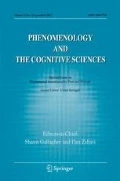Abstract
This paper distinguishes between two senses of the term “phenomenology”: a narrow sense (drawn from Nagel) and a broader sense (drawn from Husserl). It claims, with particular reference to the moral sphere, that the narrow meaning of moral phenomenology cannot stand alone, that is, that moral phenomenology in the narrow sense entails moral intentionality. The paper proceeds by examining different examples of the axiological and volitional experiences of both virtuous and dutiful agents, and it notes the correlation between the phenomenal and intentional differences belonging to these experiences. The paper concludes with some reflections on how the focus on the broader sense of “phenomenology” serves to provide a more precise sense of what we might mean by “moral phenomenology.”
Similar content being viewed by others
Notes
This understanding goes as far back as Aristotle; cf. De anima 425b12–18; Sense and Sensibilia 448a26–30; and Nicomachean Ethics 1170a29–b1.
The term “intention” is here used in the sense deriving from intentionality. It is not to be understood as restricted to volitions. Instead, it refers to the directedness of consciousness. By virtue of this directedness a conscious subject experiences an object in a determinate way and as having a determinate, albeit further determinable, significance.
Although more complicated cases wherein the feeling or emotion is rooted in another axiological property are also possible, these in turn will point back to simpler apprehensions of an object’s or situation’s non-axiological properties.
To say that B is founded upon A is to say (1) that B presupposes A as necessary for it and (2) that B builds itself upon A so as to form a unity with it.
Husserl’s German captures this difference well in the distinction between Wertnehmen and Werturteil, which parallels the distinction between Wahrnehmung and Urteil.
References
Armstrong, D. M. (1968). A materialist theory of mind. London: Routledge and Kegan Paul.
Brentano, F. ([1874] 1924). In O. Kraus (Ed.), Psychologie vom empirischen Standpunkt. Leipzig: Felix Meiner.
Brentano, F. (1973). Psychology from an empirical point of view (A. C. Rancurello et al., Trans.). London: Routledge and Kegan Paul.
Carruthers, P. (1996). Language, thoughts, and consciousness: An essay in philosophical psychology. Cambridge: Cambridge University Press.
Carruthers, P. (2000). Phenomenal consciousness: A naturalistic theory. Cambridge: Cambridge University Press.
Caston, V. (2002). Aristotle on consciousness. Mind, 111, 751–815.
Dretske, F. (1995). Naturalizing the mind. Cambridge, MA: MIT Press.
Drummond, J. J. (2006). The case(s) of self-awareness. In U. Kriegel & K. Williford (Eds.), Self-representational approaches to consciousness (pp. 199–220). Cambridge, MA: MIT Press.
Horgan, T., & Tienson, J. (2002). The intentionality of phenomenology and the phenomenology of intentionality. In D. J. Chalmers (Ed.), Philosophy of mind: Classical and contemporary readings (pp. 520–533). New York: Oxford University Press.
Husserl, E. (1970). Logical investigations (J. N. Findlay, Trans.). London: Routledge and Kegan Paul.
Husserl, E. (1984). In U. Panzer (Ed.), Logische Untersuchungen. Zweiter Band, erster Teil: Untersuchungen zur Phänomenologie und Theorie der Erkenntnis. The Hague: Martinus Nijhoff Publishers.
Kriegel, U. (2003). Consciousness as intransitive self-consciousness: Two views and an argument. Canadian Journal of Philosophy, 33, 103–132.
Lycan, W. G. (1987). Consciousness. Cambridge, MA: MIT Press.
Lycan, W. G. (1996). Consciousness and experience. Cambridge, MA: MIT Press.
Lycan, W. G. (1997). Consciousness as internal monitoring. In N. Block, O. Flanagan & G. Güzeldere (Eds.), The nature of consciousness (pp. 754–771). Cambridge, MA: MIT Press.
Mulligan, K. (1998). From appropriate emotions to values. The Monist, 81, 161–188.
Mulligan, K., & Smith, B. (1985). Franz Brentano on the ontology of mind. Philosophy and Phenomenological Research, 45, 627–644.
Nagel, T. (1974). What is it like to be a bat? The Philosophical Review, 83, 435–450.
Rosenthal, D. M. (1986). Two concepts of consciousness. Philosophical Studies, 94, 329–359.
Rosenthal, D. M. (1997). A theory of consciousness. In N. Block, O. Flanagan & G. Güzeldere (Eds.), The nature of consciousness (pp. 729–753). Cambridge, MA: MIT Press.
Smith, D. W. (1986). The structure of (self-)consciousness. Topoi, 5, 149–156.
Smith, D. W. (1989). The circle of acquaintance. Dordrecht: Kluwer.
Smith, D. W. (2004). Mind world. Cambridge: Cambridge University Press.
Tye, M. (1995). Ten problems of consciousness. Cambridge, MA: MIT Press.
Tye, M. (1999). Phenomenal consciousness: The explanatory gap as a cognitive illusion. Mind, 108, 705–725.
Zahavi, D. (1998). Brentano and Husserl on self-awareness. Etudes phénoménologiques, 27–28, 127–169.
Zahavi, D. (1999). Self-awareness and alterity. Evanston, IL: Northwestern University Press.
Zahavi, D. (2005). Subjectivity and selfhood: Investigating the first-person perspective. Cambridge, MA: MIT Press.
Author information
Authors and Affiliations
Corresponding author
Rights and permissions
About this article
Cite this article
Drummond, J.J. Moral phenomenology and moral intentionality. Phenom Cogn Sci 7, 35–49 (2008). https://doi.org/10.1007/s11097-007-9064-0
Published:
Issue Date:
DOI: https://doi.org/10.1007/s11097-007-9064-0




